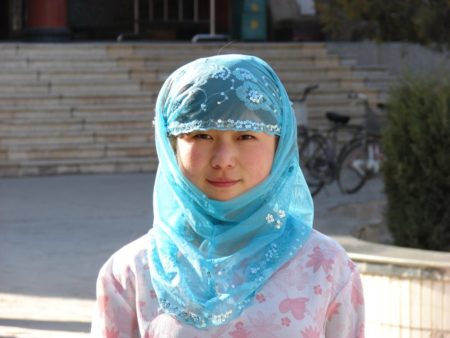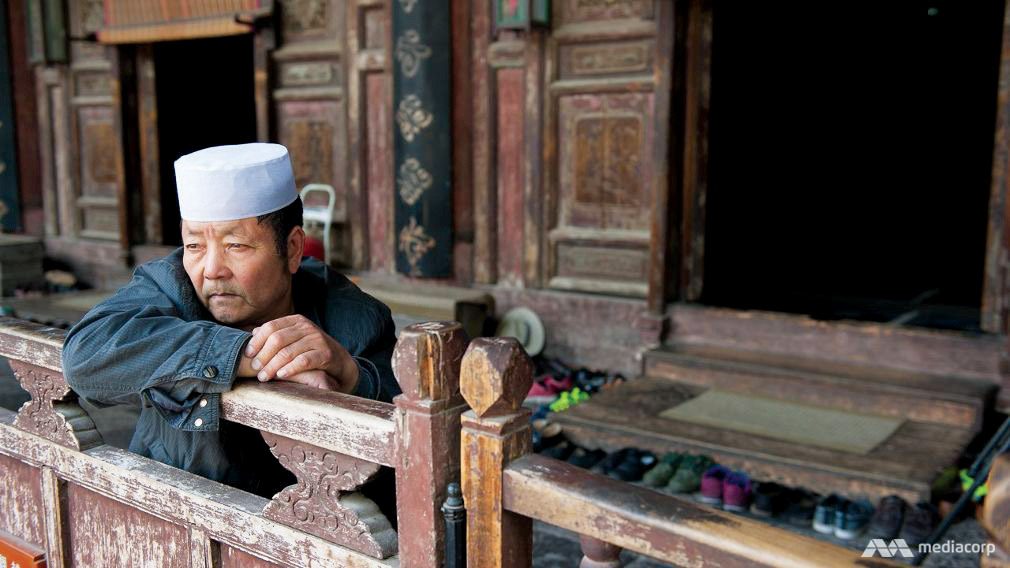Maliki opened the front door of his family’s restaurant; from the steamy room a wave of conversations in Mandarin flowed out onto the street as he slipped into the cool night air. He had just finished cooking another batch of sanzi (4-6-foot-long fried noodles) for their Hui customers and he wanted a moment’s break outdoors.
Maliki’s father founded their family’s qingzhen (Halal) food restaurant here nearly 40 years ago. Now Maliki and his older brother run the business, well known for its tasty Hui mutton dumplings. Their sister Ma Ying, on the other hand, chose with her parents’ approval, to become an Imam. She oversees the women’s mosque located three blocks away, teaching the Qur’an and tutoring other Hui women and their children in the Arabic language. (The Hui learn to pray in Arabic but many need help to understand what they are saying.)
Maliki’s breath was visible in the lighted street as he scanned the parka-covered bodies walking quickly across the cold pavement dusted with snow. Many of the men wore their white prayer caps and the women their hijabs (head coverings). Maliki nodded a greeting to two friends he spotted chatting by a tea stall across the road. Linyi and Dunjing are already married, but Maliki’s parents have held off his engagement a little longer as the arranged-for fiancée has not yet turned 14. Soon he will join the young men and they’ll walk together down the road to enter the ornate mosque for evening prayers. There are more than one hundred mosques in Maliki’s city, each having its unique architecture – a product of mixed Arab Islamic and Chinese cultural values for 1300 years.

The Hui people number about 14 million and are the largest Muslim people group in China. They can be found living in almost every county in the country but the majority inhabit the northwest. Hui are Sunnis, and while the practice of their faith varies somewhat from place to place, they are very resilient. Most Han Chinese (the majority population) have difficulty relating to the Muslim Hui; ignorance and prejudice often keep them separated. Nevertheless, Hui have enjoyed favor with recent governments who have exempted this people group from the historic one-child policy and allowed their registered mosques to grow and flourish.
The Hui are known for extending kindness and warm hospitality to strangers. However, nearly all 14 million Hui will face an eternity separated from their Creator unless they are receptive to the message of those who sow the seed of Jesus’ Good News.
Pray for the Hui of East Asia
- Pray that many Muslim Hui would come to view their beliefs with dissatisfaction… and grow in awareness that, without someone greater than themselves or their god, they cannot change. May they hunger for the true source of meaning in life – Jesus Christ.
- Pray that God would orchestrate open eyes, listening ears and receptive hearts among the Hui, so that the Good News, when sown, will germinate, take root and bear much fruit for the extension of his reign in many Hui families.
- Ask the Lord to add many more workers to the few Han Chinese believers who are obeying the Great Commission and going to the Hui with the gospel. May ignorance and prejudice be overcome by the power and love of Jesus.
- Pray the enablement of God’s Spirit for those few workers among the Hui to bear much fruit.
- PRAISE! and pray for the small number of Hui believers. May the Father work in them to grow their courage and obedience as disciples, find opportunities to meet together, and experience the grace of God as salt and light among their Muslim Hui family, friends and coworkers.
